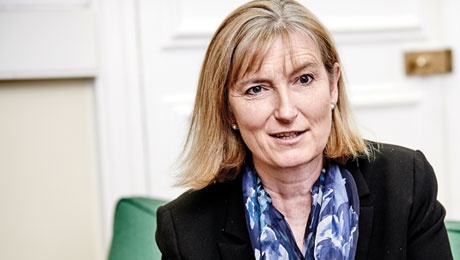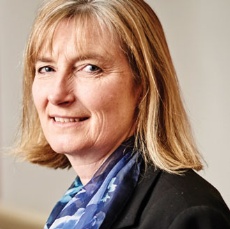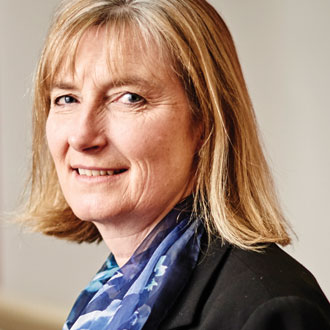
We are looking for Dr Sarah Wollaston in the gloomy carpeted halls of the Houses of Parliament when she creeps up behind us, grinning broadly.
But despite the former GP’s soft steps, she has made a big impact in the corridors of power since being elected as a Conservative MP in 2010.
She recently bagged one of the most prominent non-ministerial health policy positions when she was elected chair of House of Commons health committee – and is already creating waves.
‘You come into politics and you’re considered to be a good member of a team if you simply agree with everything. But I’m pretty clear that you will be a better member of the team if you point out what the problems are going to be. I’m better suited to scrutiny and challenge.’
Her willingness to make a stand has won Dr Wollaston praise. She confronted Jeremy Hunt over GP shortages in the House of Commons, asking the health secretary whether he agreed ‘that we will not increase capacity in primary care unless we address the workforce shortage in general practice and broaden the skill mix of those who can see people in primary care?’
‘It’s easy for politicians to introduce these kinds of targets and directives without remembering there are unintended consequences’
Dr Sarah Wollaston
She has also been outspoken on public health, reminding the Prime Minister that ‘whenever alcohol is too cheap, more people die’ and criticising Number 10’s initial U-turn on plain cigarette packaging – a battle that has since been won.
Dr Wollaston attributes her success as an MP to her 35 years as a GP, saying that surgeries with her constituents are ‘very similar’ to those in general practice.
‘What you do,’ she explains, ‘is you try to see what you can agree might be a way forward, on both sides, that could make a difference – just as you would in general practice.
‘You’re trying to make a difference to individual people’s lives and advocate on their behalf, and it’s immensely challenging and rewarding.’
As a former GP, she has an interesting view on how the manifestos of the major political parties will affect general practice after the election on 7 May.
The Conservatives and Labour have both promised thousands more GPs, despite recent figures showing that more GPs are applying to practise abroad and that applications for GP training from UK medical graduates are plummeting.
‘Politicians sometimes forget that the UK does not have a surfeit of GPs available,’ she says.
‘We need to address what has been a longstanding problem, and that is the bias within the initial training of doctors in medical schools towards hospital-based careers.
‘I still feel that general practice is a fantastic, rewarding career, but it doesn’t receive sufficient time within the medical school curriculum.’
She hints that the health committee may look at this in the future – if she keeps her seat in Parliament.
‘It will be very interesting to look at the workforce challenge in primary care – the things that are deterring people from coming into general practice or forcing that retirement bulge. Are doctors feeling overwhelmed by workload, and indeed, what effect are bureaucracy and paperwork having?’
GP access is another major battleground for the major parties in the run-up to May’s poll. Dr Wollaston is refreshingly honest about her views of the Prime Minister’s preoccupation with seven-day access to GP practices.
‘Seven-day access is popular with patients. I get a lot of correspondence about this and, genuinely, people like access. I think it’s worth trying,’ Dr Wollaston admits.
‘But I think we need to be clear about what the challenges are, and seven-day access might not be possible in all parts of the UK.’
Showing a touch of party tribalism, she is a lot more strident about Labour’s plans to reinstate the 48-hour waiting target for appointments in GP practices if it wins power.

‘It’s very easy for politicians to introduce these kinds of targets and directives without remembering there are unintended consequences,’ she warns.
‘If you have it as a rigidly enforced target, then you get unintended consequences. All GPs would love to be able to offer appointments within 48 hours. But the challenge is the workforce.’
Dr Wollaston recently chaired a particularly controversial session of the health committee, when GMC chair Professor Terence Stephenson said fitness-to-practise hearings were an ‘occupational hazard’ for doctors and that they needed to build up resilience, like soldiers in Afghanistan.
The comments created uproar among GPs, and although Dr Wollaston says the regulator should not be too ‘punitive’, she supports the general thrust of Professor Stephenson’s views.
‘The point the GMC is right to raise, is how you have greater resilience training for doctors about complaints,’ she says.
‘Of course, complaints on an individual level feel incredibly threatening, but they are going to increasingly become a part of the experience of being a doctor.’
She also sympathises with the CQC’s new policy of publishing ‘intelligent monitoring’ data on practices.
‘The CQC is sort of damned if they do and damned if they don’t. If they don’t maintain an open policy, they can be criticised for that, but it has caused – rightly – real consternation, particularly the publication of some of their risk stratification, and the way they then had to issue clarification because some of those figures were incorrect.
‘I think it is very hard for practices that find themselves labelled in a way that’s so easily open to interpretation by the public.’
But she concedes that: ‘If they show there’s really no correlation [with true levels of risk] then I think the CQC should review its policy of publishing.’
Dr Wollaston has ploughed her own furrow in Westminster, but arguably she has made it easier for politically minded GPs who may want to take the leap into becoming an honourable member.
‘For all the negativity there is about politics and politicians, I think having more people in politics who’ve had direct clinical experience is really important,’ she says.
‘If I had a message to include as part of this interview, it would be to encourage GPs to think about standing for Parliament, because there’s a real shortage of people within Parliament who have an understanding of health and social care. We really are in a tiny minority,’ she adds. ‘If anyone wants to ask about how to do it, I’m always happy to chat to people,’
‘But who knows?’ Dr Wollaston smiles. ‘I may be back and solving the GP workforce crisis in a much more direct and personal manner after 7 May.’ On her record as an MP so far, many will hope that does not happen.
Quickfire Q&A
Should we adopt four-year training?
In an ideal world it’s a good idea, but if we shift suddenly from three to four years, we might inadvertently worsen recruitment. We should work towards it and start to offer more opportunities for it.
Is 5,000 extra GPs by 2020 realistic?
We need to keep pushing towards that goal. Alongside that, we need to look at diversifying the primary care workforce, so we bring in other resources, like pharmacy, to help.
What do you think of the coalition’s record?
Large-scale reorganisations take people’s eyes off the ball of the real challenge. My hope for after the election is that we don’t see that happen again.
Do doctors facing a complaint need greater support?
Yes, of course. The issue for GPs about burnout, and how they’re supported, is very difficult because GPs are self-employed.
Should CQC inspections be scrapped to help retain GPs?
I don’t think that is what’s pushing people out of general practice, but of course, if that was submitted as evidence by GPs to a subsequent health select committee, that would then be looked at.

















